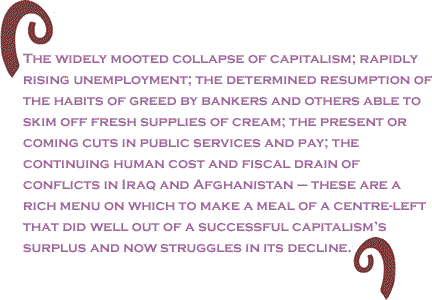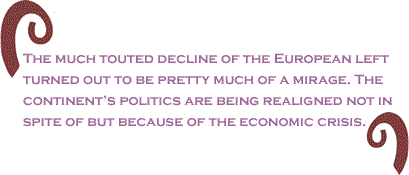
|
||||||||||||||||||||||

|
|
 |
|
The reported demise of the European left has been greatly exaggerated. In fact, with the results of Sunday’s balloting in Greece a case can be made for the opposite conclusion. “A specter is haunting Europe — the specter of Socialism’s slow collapse,” wrote Steven Erlanger in the New York Times. “Even in the midst of one of the greatest challenges to capitalism in 75 years, involving a breakdown of the financial system due to ‘irrational exuberance,’ greed and the weakness of regulatory systems, European Socialist parties and their left-wing cousins have not found a compelling response, let alone taken advantage of the right’s failures,” wrote Erlanger September 28. That line has been conspicuously repeated in articles in the major U.S. media over the past few weeks, the thread being that even amid the severe economic crisis voters in the major industrialized countries are moving to the right. However, the evidence for this shift, for Erlanger’s contention that the left is being “trounced,” across the continent simply isn’t there. That is, unless you start confusing categories like “socialist” with “social democratic” and “left.” It’s true that the fortunes of the mainline social democratic or labor parties have declined (but even that is not a severe as it is being portrayed). It’s possible to see it that way if you ignore how well some of the “left-wing cousins” are doing. Let’s look at some of the recent election tallies:
And so it goes. The much touted decline of the European left turned out to be pretty much of a mirage. The continent’s politics are being realigned not in spite of but because of the economic crisis. And the much of the gain has gone to the left – taken as a whole. In fact, as each of these results indicates, it was precisely the performance of the traditional socialist parties in response to the crisis that motivated the balloting. In some cases it was their failure to adequately challenge the economic policies of the conservatives and present clear alternatives that resulted in misfortune for the social democratic parties. A major point of contention has been the right’s drive for “labor market reform” – which means relaxing labor regulations, weakening trade union influence, making it easier to fire workers and reducing labor costs. Although the Socialist came out on top in Portugal, “anger over the government's reforms drove many Socialist voters to the hard left,” reported AFP. The incoming center right government in Germany “is
good for Germany’s economy and business – but how good remains to
be seen,” observed the Financial Times. “The outcome is complex.
Paradoxically, Germany appears to Perhaps the drive to picture a rise of the right and the supposed decline of the left was prompted by the now likely (don’t count your chickens) electoral rout of what passes for the “left” in the upcoming election in Britain. The Conservatives appear headed for victory over divided and dispirited Labour Party. It is, there perhaps that the crisis of classic social democracy is most obvious. “The irony – that the left fails together with the banks – has been much noted, but may be less of a contradiction than is apparent, “ writes John Llyod in the Financial Times October 2. “In different ways, European social democracy was pro-market and pro-globalization – especially New Labour, which in Tony Blair’s early years in power was both leader and exemplar. Liberal social reforms, a lesser role for trade unions and, above all, mass immigration were all part of centre-left politics and were broadly acceptable to the mass of the people so long as living standards rose and public services improved. Now, that implicit deal is threatened.”
“In this situation, it is not only the right that exults,” Llyod wrote. “The left, within these mainstream parties and outside, now sees a chance. The times are propitious: those charged with writing a manifesto for a party such as Die Linke … would have a pleasant task. The widely mooted collapse of capitalism; rapidly rising unemployment; the determined resumption of the habits of greed by bankers and others able to skim off fresh supplies of cream; the present or coming cuts in public services and pay; the continuing human cost and fiscal drain of conflicts in Iraq and Afghanistan – these are a rich menu on which to make a meal of a centre-left that did well out of a successful capitalism’s surplus and now struggles in its decline. John Harris, the left-Labour commentator, encapsulated his position’s scorn for New Labour in the current issue of Prospect magazine, describing its policies as ‘a mishmash of beliefs that only entrenched the changes wrought by Margaret Thatcher’.” Often, the most perceptive rejoinders to articles
that appear in the major print media are found in the comments section.
But you won’t see them unless you are online because they don’t
show up in the letters-to-the editor section. “This is just total
nonsense,” wrote Christiuan Haesemeyer of Los Angeles in response
to Erlanger’s premature obituary for the European Left. “The reason
parties like the SPD suffer is because they aren't socialist any
longer. In those countries where the further left have gotten their
act together - Germany, Portugal, France - parties to the left of
the old reformist social democratic ones have begun to flourish.
It is amazing that Erlanger completely ignores the string of outstanding
results for the new Die Linke (The Left) party in Germany (which
gained 12 percent of the vote in Sunday's general elections, and
is the second strongest party in a number of states), as well as
the very strong results for the Left Bloc in Portugal (they doubled
their number of parliamentary seats in Sunday's elections), the
popularity of radical left figures in France, the election of a
Trotskyist to the European parliament in Ireland.
BlackCommentator.com Editorial Board member Carl Bloice is a writer in San Francisco, a member of the National Coordinating Committee of the Committees of Correspondence for Democracy and Socialism and formerly worked for a healthcare union. Click here to contact Mr. Bloice. |
|
 |
|
Any BlackCommentator.com article may be re-printed so long as it is re-printed in its entirety and full credit given to the author and www.BlackCommentator.com. If the re-print is on the Internet we additionally request a link back to the original piece on our Website. Your comments are always welcome. eMail re-print notice
If you send us an eMail message we may publish all or part of it, unless you tell us it is not for publication. You may also request that we withhold your name. Thank you very much for your readership. |
|
| |
|
| October
8 , 2009 Issue 345 |
|
| Executive Editor: Bill Fletcher, Jr. |
| Managing Editor: Nancy Littlefield |
| Publisher: Peter Gamble |
| Est. April 5, 2002 |
Printer Friendly Version
in resizeable plain
text format or pdf
format. |
 |

|
| |
| |












































